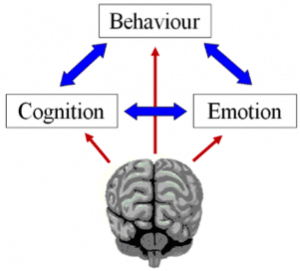
Modern psychology is founded upon an understanding of the ways that thinking (cognition), emotion and behavior influence each other (blue arrows). Breakdowns or anomalies in any of these domains can give rise to mental health problems and Clinical Psychologists primarily work at addressing such imbalances or anomalies. Clinical Neuropsychologists are more expert at understanding the direct effects of brain dysfunction on these domains (red arrows), as well as the possible resultant changes this may cause between cognition, behavior, and emotion (blue arrows).
“Clinical Neuropsychologists apply specialized knowledge in the assessment, diagnosis, treatment, and rehabilitation of individuals with neurological, medical, or neurodevelopmental disorders across the lifespan” according to the American Psychological Association (APA). Most clinicians who practice Clinical Neuropsychology have a focus on performing neuropsychological evaluations to assist with various central nervous system disorders whether these disorders are acquired, such as from an accident or stroke, or are functional deficits are from genetic or developmental disorders.
There is a training and clinical service delivery model in Australia that is more inclusive in bringing conceptualization of evaluation and treatment together between clinical psychology and clinical neuropsychology. The model is depicted below.
With the advances in neuroscience, the development of strong scientifically based diagnostic and clinical treatment procedures such as QEEG (Quantitative Electroencephalography) developed and used by Applied Neuroscience (see www.appliedneuroscience.com), along with non-invasive types of low-level stimulation (see www.neurofield.org) there are many innovative and scientifically sound ways to enhance the healing process. These methods and techniques may be used in conjunction with the more standard psychotherapy and counseling methods to augment treatment response. These innovative neurotherapy techniques have been successfully used with families and individuals where medications have shown to be ineffective or problematic. Neurotherapy techniques are certainly helpful along with psychiatric medication schedules as well.

Dr. Alford is a Ph.D. licensed clinical psychologist. He holds a postdoctoral certificate in Clinical Neuropsychology that includes over 1000 postdoctoral academic hours and over 2000 hours of supervised postdoctoral clinical experience. In addition, Dr. Alford is BCIA certified (Biofeedback Certification International Alliance). He has 15 years of experience with neurofeedback and 8 years with non-invasive stimulation. At Fox Valley Institute, Dr. Alford has valued and molded his practice approach on being a treating clinician, as well as a clinical neuropsychologist. He has been referred to as a “functional” clinical and neuropsychologist.
Dr. Alford explains that neuropsychological assessments are a specialized form of psychological testing that provides more information on how certain neurological conditions affect mental health and the functioning of the nervous system. These assessments are more comprehensive, offering insight into overall cognitive processes. They can also evaluate underlying neurological or neurodevelopmental disorders and allow for a more complete treatment plan. Children and adults with unresolved trauma, difficulties with various forms of anxiety, depression/mood regulation problems, dyslexia, attention regulation difficulties, along with some forms of head trauma, concussion, or mild traumatic brain injury (mTBI) would benefit from utilizing these powerful methods.



